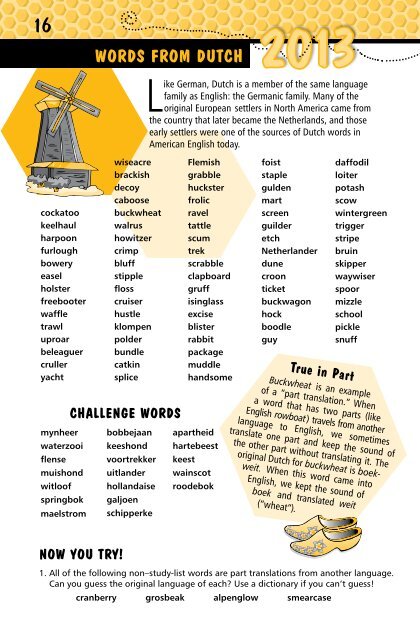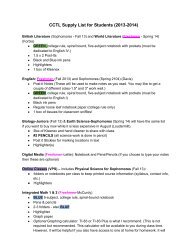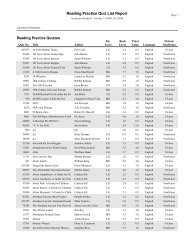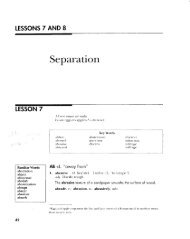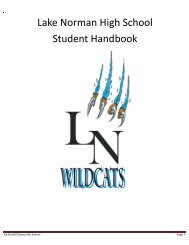Spell It!
Spell It!
Spell It!
You also want an ePaper? Increase the reach of your titles
YUMPU automatically turns print PDFs into web optimized ePapers that Google loves.
16<br />
cockatoo<br />
keelhaul<br />
harpoon<br />
furlough<br />
bowery<br />
easel<br />
holster<br />
freebooter<br />
waffle<br />
trawl<br />
uproar<br />
beleaguer<br />
cruller<br />
yacht<br />
mynheer<br />
waterzooi<br />
flense<br />
muishond<br />
witloof<br />
springbok<br />
maelstrom<br />
noW You trY!<br />
2013 Like German, Dutch is a member of the same language<br />
family as English: the Germanic family. Many of the<br />
original European settlers in North America came from<br />
the country that later became the Netherlands, and those<br />
early settlers were one of the sources of Dutch words in<br />
American English today.<br />
WordS from dutch<br />
wiseacre<br />
brackish<br />
decoy<br />
caboose<br />
buckwheat<br />
walrus<br />
howitzer<br />
crimp<br />
bluff<br />
stipple<br />
floss<br />
cruiser<br />
hustle<br />
klompen<br />
polder<br />
bundle<br />
catkin<br />
splice<br />
chALLenGe WordS<br />
bobbejaan<br />
keeshond<br />
voortrekker<br />
uitlander<br />
hollandaise<br />
galjoen<br />
schipperke<br />
Flemish<br />
grabble<br />
huckster<br />
frolic<br />
ravel<br />
tattle<br />
scum<br />
trek<br />
scrabble<br />
clapboard<br />
gruff<br />
isinglass<br />
excise<br />
blister<br />
rabbit<br />
package<br />
muddle<br />
handsome<br />
apartheid<br />
hartebeest<br />
keest<br />
wainscot<br />
roodebok<br />
foist<br />
staple<br />
gulden<br />
mart<br />
screen<br />
guilder<br />
etch<br />
Netherlander<br />
dune<br />
croon<br />
ticket<br />
buckwagon<br />
hock<br />
boodle<br />
guy<br />
true in part<br />
Buckwheat is an example<br />
of a “part translation.” When<br />
a word that has two parts (like<br />
English rowboat) travels from another<br />
language to English, we sometimes<br />
translate one part and keep the sound of<br />
the other part without translating it. The<br />
original Dutch for buckwheat is boek-<br />
weit. When this word came into<br />
English, we kept the sound of<br />
boek and translated weit<br />
(“wheat”).<br />
daffodil<br />
loiter<br />
potash<br />
scow<br />
wintergreen<br />
trigger<br />
stripe<br />
bruin<br />
skipper<br />
waywiser<br />
spoor<br />
mizzle<br />
school<br />
pickle<br />
snuff<br />
1. All of the following non–study-list words are part translations from another language.<br />
Can you guess the original language of each? Use a dictionary if you can’t guess!<br />
cranberry grosbeak alpenglow smearcase<br />
Old English was the language spoken in Britain before the<br />
French arrived in 1066. If you could listen to<br />
a conversation in Old English, you would<br />
probably be scratching your head a lot. A few of<br />
the words would make sense, but most of them<br />
wouldn’t. Like plants and animals, languages<br />
evolve—keeping the things that they find useful,<br />
discarding others, and picking up new things along<br />
the way. This study list represents some of the real<br />
success stories in English: words coined long ago that have not<br />
lost their usefulness over dozens of generations!<br />
quell 1<br />
barrow<br />
dearth<br />
bower<br />
paddock<br />
blithe<br />
keen<br />
mongrel<br />
reckless<br />
alderman<br />
whirlpool<br />
belay 2<br />
cleanser<br />
dreary 3<br />
bequeath<br />
sallow 4<br />
dross<br />
lithe<br />
gristle<br />
earwig<br />
heifer<br />
mistletoe<br />
salve<br />
kirtle<br />
fickle<br />
nestle 5<br />
fennel<br />
nostril<br />
abide<br />
behest<br />
slaughter 6<br />
gospel<br />
furlong<br />
linseed<br />
nether<br />
fathom<br />
nightingale<br />
farthing<br />
threshold<br />
kith<br />
wanton<br />
loam 7<br />
yield<br />
mattock<br />
chALLenGe WordS<br />
Wiccan<br />
shrieval<br />
chary<br />
WordS from oLd enGLISh<br />
hawthorn<br />
tithe<br />
behoove<br />
forlorn<br />
quiver<br />
hustings<br />
aspen<br />
mermaid<br />
anvil<br />
barley<br />
linden<br />
hassock<br />
orchard<br />
hearth 8<br />
watery<br />
fiend<br />
goatee<br />
earthenware<br />
windily<br />
dealership<br />
bookkeeping<br />
fiery<br />
learned<br />
nosiest<br />
creepy<br />
errand<br />
daily<br />
gnat<br />
broadleaf<br />
stringy<br />
dairy<br />
workmanship<br />
newfangled<br />
timely<br />
dogged<br />
mootable<br />
tip from the top<br />
womanly<br />
manhandle<br />
folksiness<br />
worrisome<br />
roughhewn<br />
knavery<br />
hurdle<br />
kipper<br />
hundredth<br />
icicle<br />
pinafore<br />
yieldable<br />
hue<br />
17<br />
(For footnotes, see <strong>Spell</strong>ing<br />
Tips, pages 18–19.)<br />
You have a great advantage<br />
in learning to spell a word<br />
that has been in English for a very<br />
long time. Chances are that the word<br />
belongs to a group of words that show<br />
the same spelling pattern, since words in<br />
all languages have a habit of conforming<br />
to each other over time. As you study<br />
the words on the list, try to remember<br />
them together with another<br />
word or words with a similar<br />
sound and spelling.


